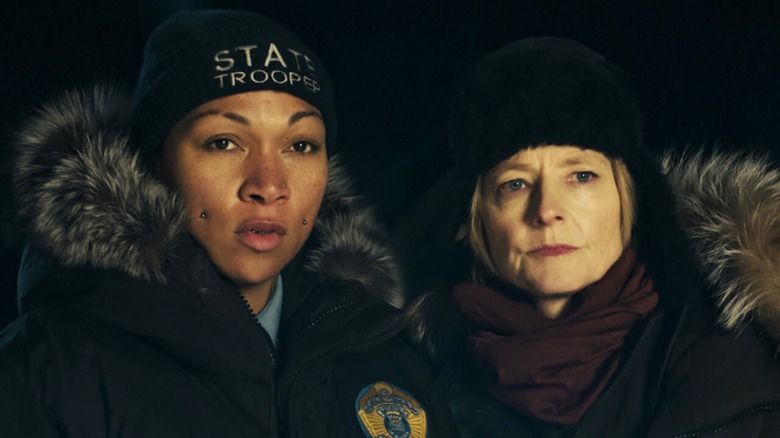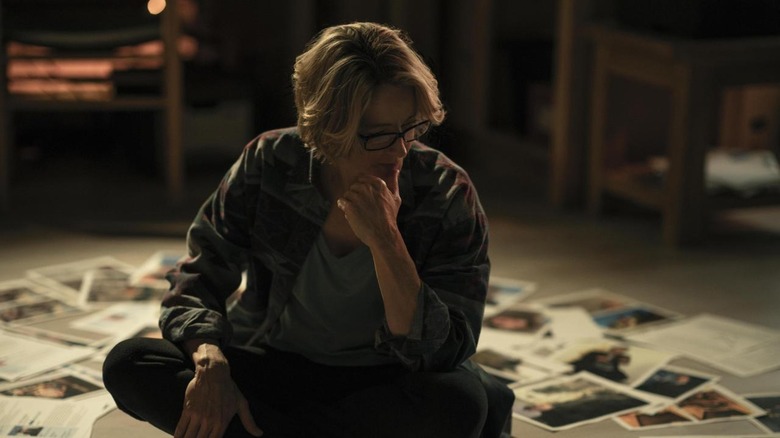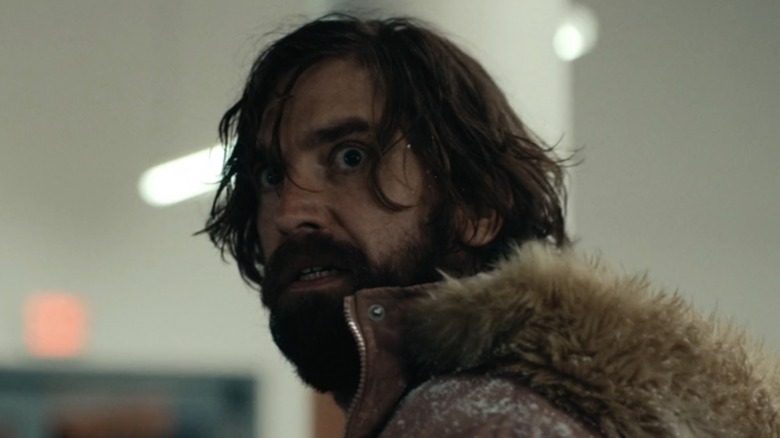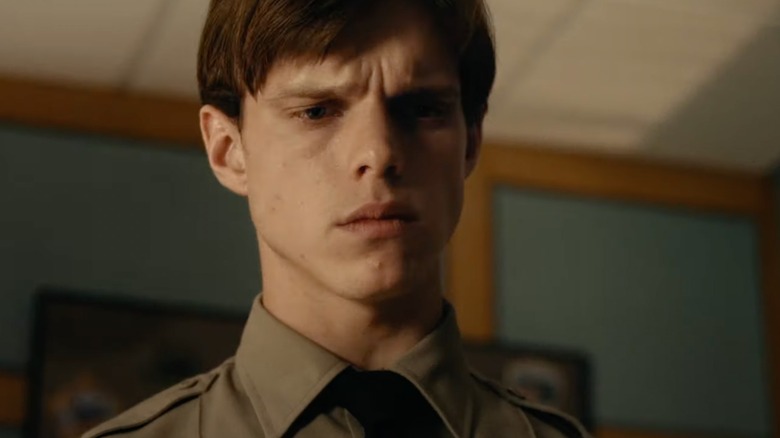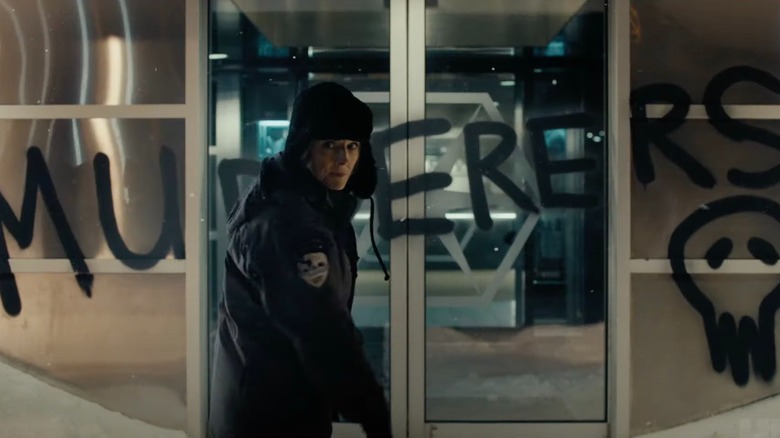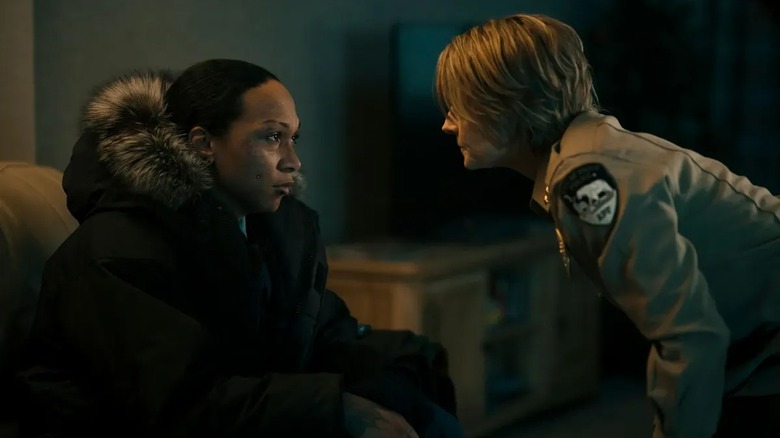True Detective: Night Country Ending Explained: Time Is No Longer A Flat Circle
This post contains spoilers for "True: Detective: Night Country."
"This is a world where nothing is solved. Someone once told me that time is a flat circle. Everything we have ever done or will do, we're gonna do over and over and over again."
Matthew McConaughey's Rustin Cohle utters these words in season 1 of "True Detective," underlining the Theory of Eternal Recurrence, a thought experiment meant to test out one's emotional response to a never-ending, cyclical loop. Rust's words are tinted by a sense of nihilism, as he is at a point where he believes that there is no way to break through this loop, where evil will always find a way to manifest in cyclical ways throughout time. Even though the case is eventually solved, it is not truly put to rest — while a more optimistic Rust acknowledges a sliver of hope on the horizon, some questions go unanswered, and many aspects of season 1's Tuttle case remain unsolved.
Issa Lopez's "True Detective: Night Country" deliberately questions Rust's tender hope by situating its events in a locale that does not enjoy the luxury of sunlight, where hope is but a dream. The eternally dark and cold mining town of Ennis hides terrible secrets within its icy caves, which symbolize the rot gripping the populace, who are slowly poisoned and killed by the pollution from the mines. However, the show's finale circles back to Rust's tender hope while presenting a new manifesto: time is no longer a flat circle after the cycle of Eternal Recurrence is broken, where the truth has found a way to the surface and put an end to the long dark. Although some questions still linger, justice has been meted out, both by the oppressed and primordial forces of nature that remain hidden, yet are ever-present.
The lead-up to the ice caves in True Detective: Night Country
Detectives Evangeline Navarro (Kali Reis) and Liz Danvers (Jodie Foster) establish a link between the Annie K. murder case and the Tsalal fiasco pretty early on. Their biggest piece of evidence is Annie's severed tongue, which is found on the floor of the research base, believed to have been placed right before the researchers ended up on the ice. The only researcher unaccounted for is Raymond Clark (Owen McDonnell), who is revealed to have been dating Annie before her death, and the two detectives trace out several links to an underground ice cave based on Annie's final video. After drifter Otis Heiss (Klaus Tange) confirms the existence of a subterranean ice passage known as Night Country, it becomes plausible that Silver Sky mines might have a hand in covering up Annie's murder, and by extension, the Tsalal incident.
However, the reveal that Hank Prior (John Hawkes) moved Annie's body on behalf of the mine adds fresh context to this assumption — Hank claims that the mine asked him to hide her case files and that he has no choice but to shoot Heiss to keep things hidden. Hank's son, Peter (Finn Bennett), shoots him before he can shoot Danvers (after killing Heiss), and decides to take on the responsibility of dumping both bodies while Danvers and Navarro navigate the ice caves. As Heiss survived a mining accident within these caves decades ago and claimed to hear "howling" before his vision cut to black, everything points to this mysterious underground space, which is also where Clark is believed to be hiding out.
Due to the ice caves being unstable and dangerous, Navarro and Danvers fall through the thin, icy ground into an underground area. They're really deep in Night Country now.
Did Raymond Clark kill Annie in Night Country?
After a tense chase, the two detectives question Clark after forcefully subjecting him to Annie's final screams in the video on a loop. Breaking down, Clark reveals that Annie had found out the link between the mine and the research: although initially assuming that the mine was forcing Tsalal to falsify their pollution numbers (which is true), Annie finds out an even darker unsavory truth. The DNA of the microorganism the researchers were sequencing was made easier to probe into due to rising pollution, as it helped soften the permafrost and carry out the study. Furious that Tsalal was deliberately killing thousands of locals, she destroyed their research in a fit of justified rage.
Although Clark claims that he "loved" her and would never hurt Annie, we are privy to the cold truth, where we see every researcher being responsible for her gruesome death, including him. They stabbed her 32 times, and even when she was alive despite being grievously injured, Clark was the one to suffocate her to death on the ice-cave floor. After the mine was notified, Hank moved the body elsewhere, and since then, Clark seems to be hounded by visions of her return. "She has been haunting the caves before her birth," he claims, insinuating that she came back from the dead to kill the men while he hid out in the underground passage that links the base to the ice caves.
Although Clark might have seen Annie's phantom haunting him, it could very well be a manifestation of his guilt, an ugly reminder of what he had done. Although he hid out in then Night Country to escape her, he looks haggard and traumatized, willing to take the easy way out when he begs Navarro to shoot him.
The past comes back to haunt
The question of who killed the researchers is further complicated after both Navarro and Danvers see visions connected to their past while being stuck at the base. Navarro, who is far more attuned to these visions, is called out by something in the ice, while Danvers struggles to stay grounded while being pulled into the day her son, Holden, died. Both women are forced to contend with their trauma in different ways — through Navarro, who sees visions of Holden in the afterlife, Danvers is able to talk about the accident that led to Holden's death and find closure after Navarro states that Holden sees her.
This is the first time we see Danvers so vulnerable, as she was furious before when Navarro had wanted to tell her about Holden in her visions. "I am not merciful. I have no mercy left in me," she proclaimed, but this hardened instinct cracks once Navarro listens to her recount the past. Similarly, Navarro finds closure after reaching out to the phantom of one of her elders, where she finally learns her Inuit name, solidifying her sense of belonging to the community. By venturing into the ice and facing their past, both women are reborn, finally breaking through the toxic flat circle of time, and the pains that accompany it.
Peter also undergoes a similar loop when he buries his father, closing the door to this chapter forever. However, Rose (Fiona Shaw) sagely reminds him that the worst is not over, as what comes after is unbearable, given how he has to learn to live with what he has done while taking steps towards healing himself one day at a time.
Broken systems and rightful retribution
The justice system in "Night Country" is pretty broken, overrun with corrupt cops or ineffectual ones who are unable to mete out justice after honing on the perpetrators. Although the detectives worked hard to solve the case, the "crime" concerning the researcher-corpsicle was not a crime at all. While talking about breaking the loop and "holding the door" for too long, Danvers and Navarro realize that the hidden compartment beneath the base floor was never dusted for prints. A quick search reveals a fingerprint with two missing fingers, which points to the suspicious presence of Blair Hartman, one of the former workers at Tsalal who currently works at the Blue King Laundromat.
Blaire's coworker, Bee (Diane E. Benson), tells a "story" about what might have happened at Tsalal on that fateful night. Having accidentally uncovered the secret passage, Bee learned the truth about Annie's murder and the base's research, which prompted her and several indigenous women to corner the researchers and lead them deep into the ice to be claimed by a supernatural entity. This harkens back to the Inuit myth of Sedna, where a version of this legend states that her father left her to die after cutting off her fingers and throwing her into the icy river. Living on after death, Sedna haunts the icy plains of Ennis, dealing swift retribution to anyone who disturbs her sleep or hurts her daughters in the name of progress.
The researchers had awakened her by digging deep into the ice, and Bee and the local women only led the criminals to her to see whether she would take them — she does, "eating out their pain from inside and spitting out their frozen bones" without mercy.
The spiral of pain is broken, for now
It is heavily hinted that Clarke was also killed by Sedna, having finally paid the price for his transgressions. The researchers were wilfully killing thousands of indigenous people in the name of research that might have never come to fruition, and even if it did, the cost would've always been unacceptable. Although time is a flat circle, in the sense that Sedna will devour anyone if her slumber is broken or cruel crimes are committed in her home, this loop is temporarily broken after Navarro and Danvers release the truth about the mine to the public. Silver Sky is done for, and will pay for their crimes, while the rise of the sun after endless nights symbolizes a new beginning, which is also what Navarro's Inuit name means: the first light after the long dark.
Navarro disappears as she had wished to, and the practical aspects of the investigation are brought to a close after Danvers testifies by stating that Heiss was killed by Hank and that the latter might have died during the snowstorm. After commenting that she has no idea where Navarro is, the season ends with her and Leah visiting Navarro's cabin, tucked somewhere in the icy plains, away from the town. This is a fresh start for everyone, who can now hold on to the tender buds of hope and heal while moving forward.
A few questions still linger, such as who placed Annie's tongue at the base that night, and the nature of the remains of the massive exoskeleton (resembling a spiral) on the cave ceiling in the finale. Nevertheless, some questions are best left unanswered, especially when an Aurora Borealis bursts through the night sky and gives way to the light. For now, all is well.
